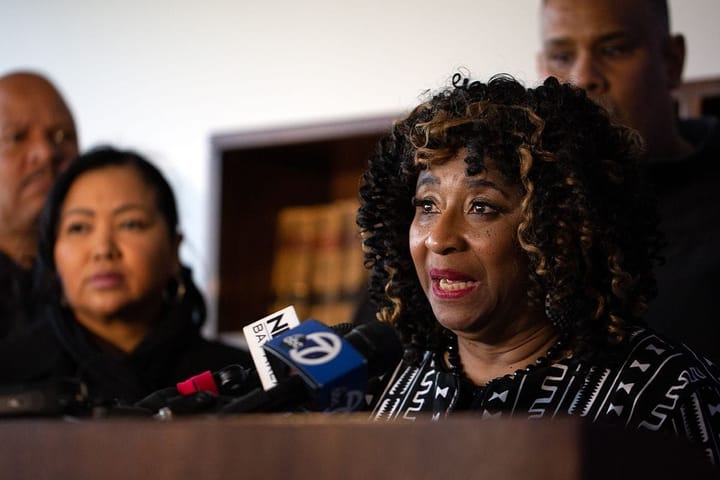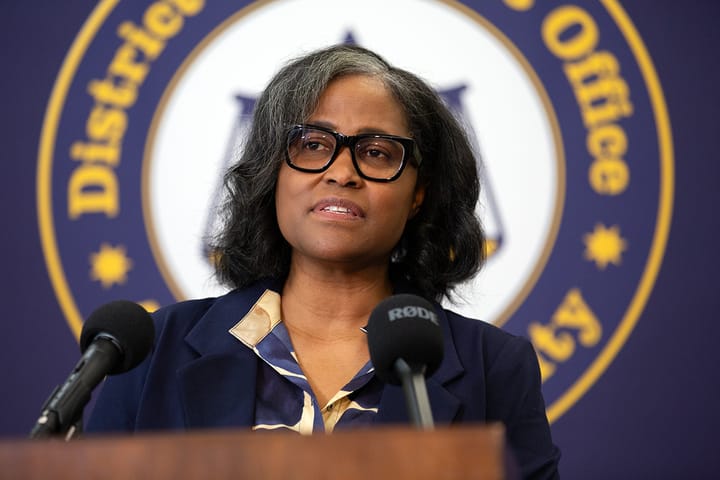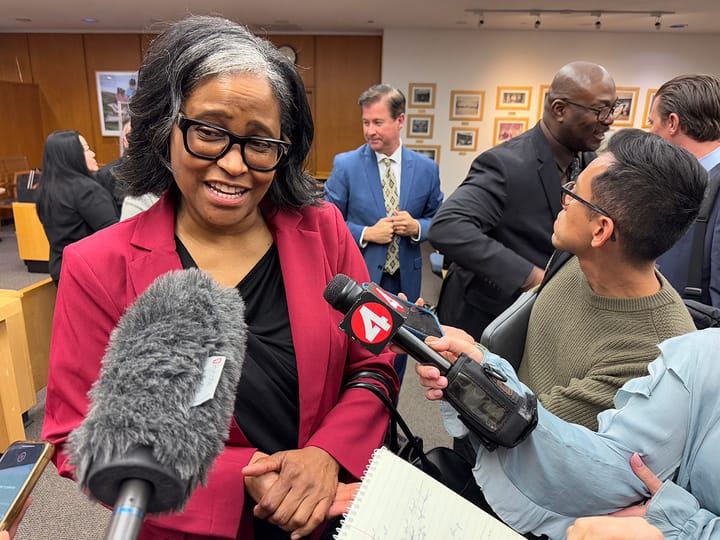Another top deputy of DA Price committed misconduct at his last job, investigation found
A former high-ranking OPD command staffer told The Scanner that Price did not ask about Eric Lewis at OPD, where he spent his career.
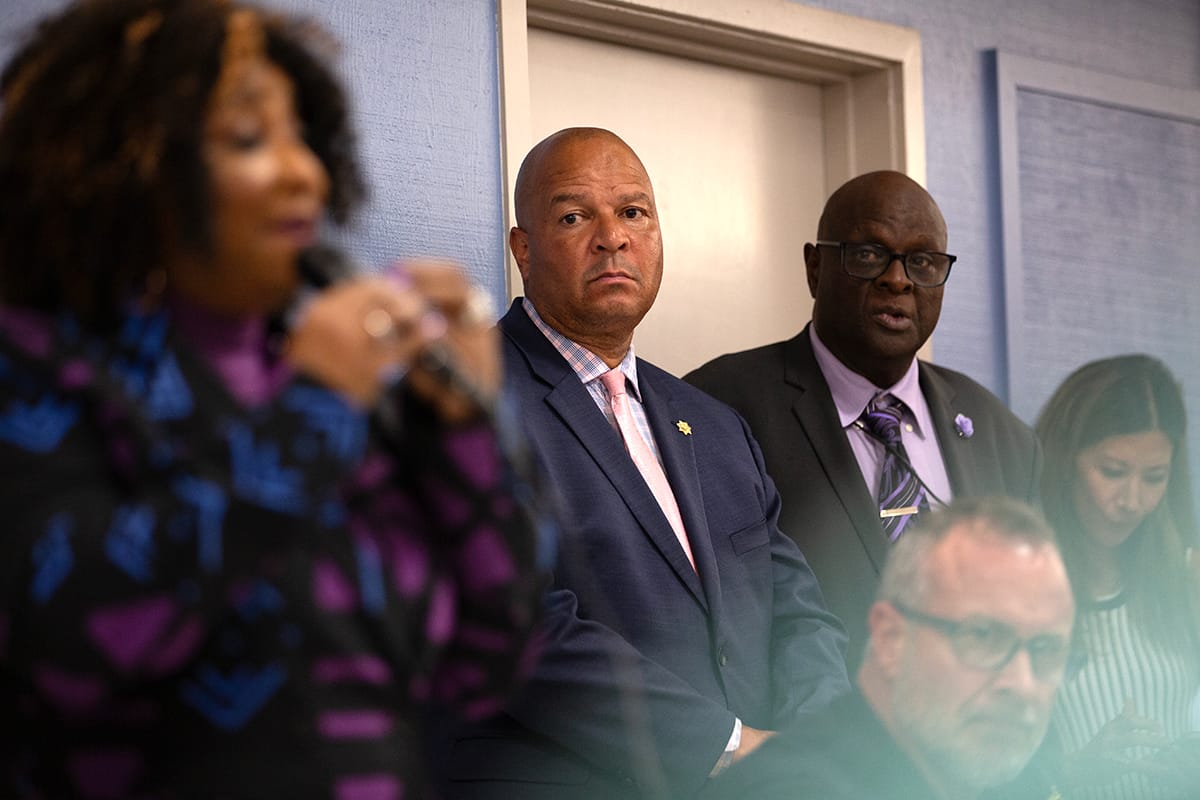
A member of DA Pamela Price's executive team committed serious misconduct when he worked at the Oakland Police Department, and abruptly retired to avoid termination, public records show.
Eric Lewis was a deputy chief at OPD when he made disparaging remarks about two of his bosses and at least one colleague over a "hot mic" during an online meeting in 2021, an Internal Affairs investigation found.
The remarks were one thing — but an outside attorney hired to look into the claims concluded that Lewis was not forthcoming when she set out to investigate them.
"I did not find the subject Deputy Chief Lewis credible and in fact, found his testimony untruthful," the attorney concluded in November 2021. "Deputy Chief Lewis' testimony was at odds with and contradicted by six witnesses and the other subjects."
Police misconduct involving dishonesty can lead to decertification in California, blocking officers from law enforcement work altogether.
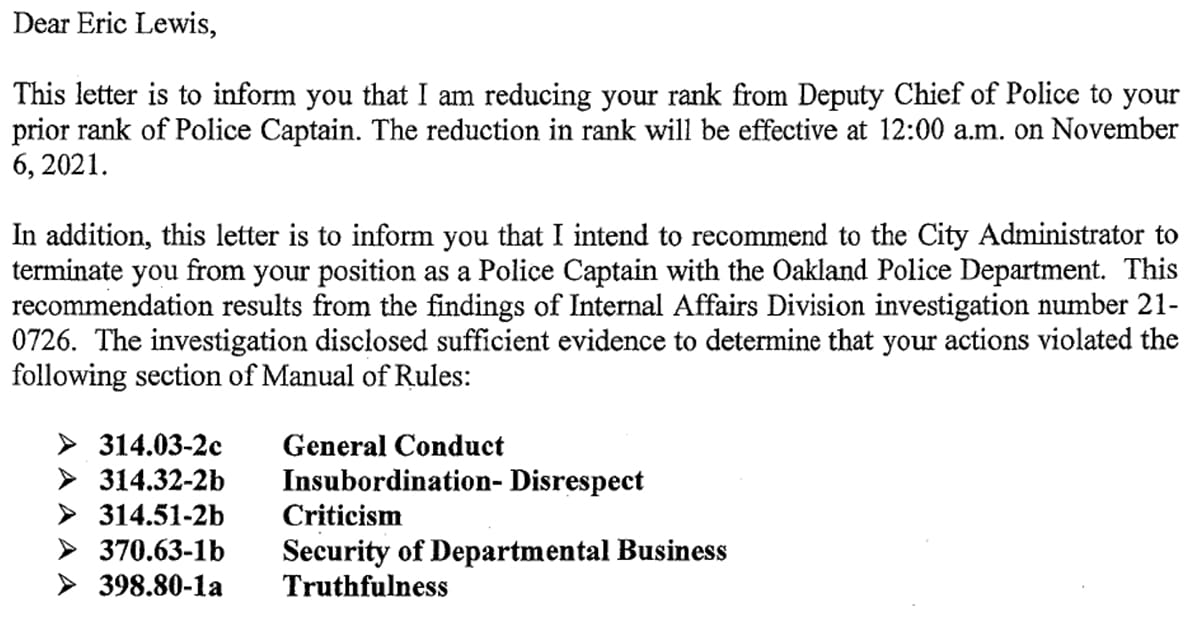
In a letter dated Nov. 5, 2021, then-OPD Chief LeRonne Armstrong demoted Lewis from his appointed role as deputy chief to his prior rank of captain.
In the letter, Armstrong said he also planned to recommend Lewis for termination.
Rather than challenge those decisions, Lewis retired from OPD a few weeks later after nearly 30 years at the department, according to public records.
In recent days, the Alameda County DA's office repeatedly declined to comment on whether DA Price knew about the sustained misconduct findings involving Eric Lewis.
But a former high-ranking OPD command staffer told The Scanner that Price had not contacted OPD to ask about his employment history or the misconduct that ended his career.
"This is something we would have told them about," the former command staffer said. "Whatever background [check] they did, they did not look into his past employment."
Another member of Price's original executive leadership team — Otis Bruce Jr. — also had a sustained misconduct finding at his former job at the Marin County DA's office. (Bruce left the Alameda County DA's office in June.)
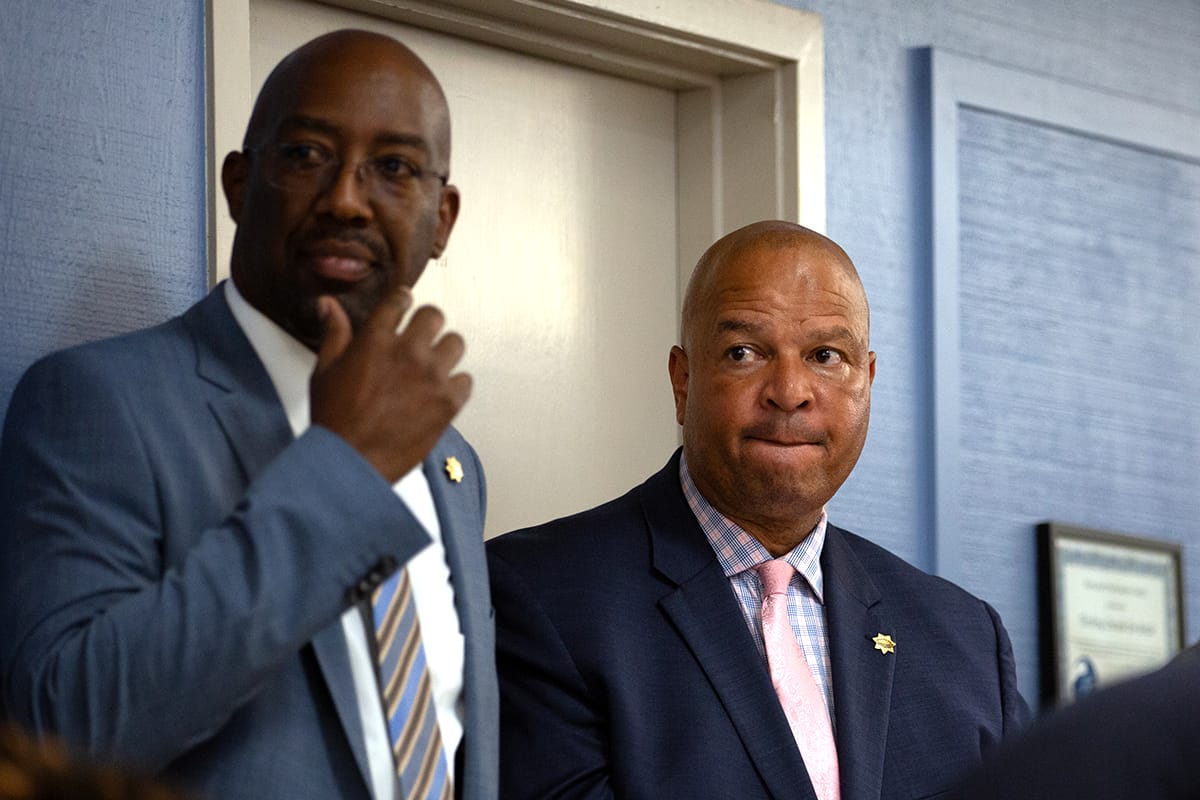
In recent days, Eric Lewis declined, through the attorney who represented him in the OPD misconduct investigation, to comment on what happened.
The Scanner also learned that Lewis had applied to work in the Alameda County DA's office as an inspector under former DA Nancy O'Malley — but was disqualified after submitting someone else's warrant as his own as part of his job application, multiple sources said.
In January 2023, many people said they were surprised to see Pamela Price bring in Lewis as part of her executive leadership team, to run the entire inspectors unit as chief inspector, particularly given what happened with his earlier application.
"It made me sick," said a high-ranking member of the O'Malley administration. "The inspectors were all asking: What the hell is this guy doing here?"

The Scanner began looking into Lewis' misconduct case at OPD in February 2023 and sought all disclosable records from the city of Oakland at that time.
The city initially said it could not look into the record request due to a high-profile cyberattack that crippled Oakland operations.
Four months later, in June 2023, the city closed the Scanner's request saying only that there were "no responsive, disclosable records" about the sustained misconduct findings.
Last week, The Scanner picked up reporting on the issue after learning from sources that the city of Oakland had posted its investigative files about Lewis online.
In recent days, The Scanner has conducted numerous interviews and reviewed hundreds of pages from OPD's investigative file to compile this report.
Why is dishonesty considered serious police misconduct?
Dishonesty — what OPD calls "untruthfulness" — is among a handful of sustained police misconduct findings for which the state requires otherwise confidential records to be released to the public.
Other examples include excessive force, unlawful arrests, sexual assault and bias.
Records related to police shootings and uses of force that result in serious injury or death must also be released — even when no misconduct is involved.
Dishonesty is one of nine types of serious police misconduct tracked by the Commission on Peace Officer Standards and Training (POST), which oversees the certification and decertification of law enforcement officers in California.
The possibility of decertification is relatively new to California: In 2021, the state legislature approved Senate Bill 2, which "established a statewide system to decertify or suspend officers who have committed serious misconduct," ACLU NorCal wrote.
"Before it passed, California was one of just four states without a process to decertify police officers," the San Francisco Chronicle reported in April.
POST declined requests for an interview related to decertification but describes on its website how the concept of police legitimacy hinges in part on whether officers tell the truth.
"Confidence in the police …. involves the belief that the police are honest, that they try to do their jobs well, and that they are trying to protect the community against crime and violence," POST writes.
Chicago calls its equivalent policy the "you lie, you die" rule, violations of which can lead to "wrongful convictions or multimillion-dollar civil lawsuits" not to mention damaging the credibility of the broader profession, a Chicago news site reported recently.
The same sentiment rings true in local law enforcement.
"If you get sustained for lying, it's essentially a death sentence," one Oakland police officer familiar with misconduct investigations told The Scanner. "If I'm a liar, how can I be a cop? You don't survive that."
It was unknown as of publication time whether POST ever reviewed the Eric Lewis misconduct matter.
Under its rules, OPD would have been required to alert POST to its sustained untruthfulness finding — but a POST spokesperson said the agency cannot comment on an investigation unless it has made a confirmed determination that an officer engaged in serious misconduct.
As of this week, according to the POST website, no such determination had been made.
The Eric Lewis misconduct investigation at OPD: What happened?
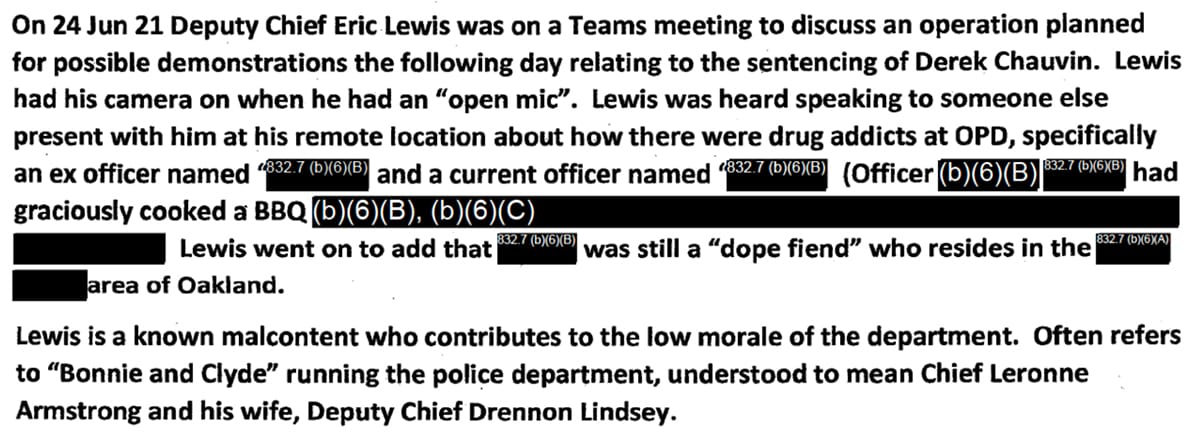
An anonymous note helped kick off the OPD investigation into what came to be called "the open microphone incident" on June 24, 2021, public records show.
A captain discovered the note, which had been placed into OPD mailboxes belonging to command staff on the morning after the call.
The note said then-Deputy Chief Eric Lewis had been overheard on a Microsoft Teams meeting making disparaging remarks about "how there were drug addicts at OPD."
The conversation, which involved at least two people who were in a room with Lewis at OPD's Eastmont substation, referenced a current officer who had overcome a substance use issue as well as a former officer, the investigation found.

When Lewis was first interviewed, he largely pointed the finger at his subordinates, the investigator wrote.
"They're having a conversation. I'm not really even paying … them any attention, honestly," Lewis told her. "I don't really care to hear it, obviously there's not any violations occurring."
An attorney for one of those men later wrote that "Lewis clearly lied throughout his statement. Then-Deputy Chief Lewis acted like he was merely a peripheral observer of gossip but in fact he drove the conversation. Then-Deputy Chief Lewis was known to be extremely disgruntled and this is an example of that."
According to the investigation, Lewis said he did not even know one of the officers had a drug problem until that day.
But a captain later testified that he had repeatedly briefed Lewis on that officer's challenges with substance use when Lewis had run their division.



OPD's Eastmont substation. OPD
During the conversation, which lasted several minutes before the Teams meeting began, the investigation found that Lewis also described then-Chief Armstrong and his wife, Deputy Chief Drennon Lindsey, as "Bonnie and Clyde," in reference to the infamous bank robbers and serial murderers.
During his first interview with the outside investigator, Lewis told her he "had no recall of ever using this term," she wrote.
When she confronted him about it during a second interview, however, he "acknowledged that it was probably true," she wrote.
Lewis told her he only meant that the couple had stuck together and said he had not used the term to indicate any "criminal context," she wrote.
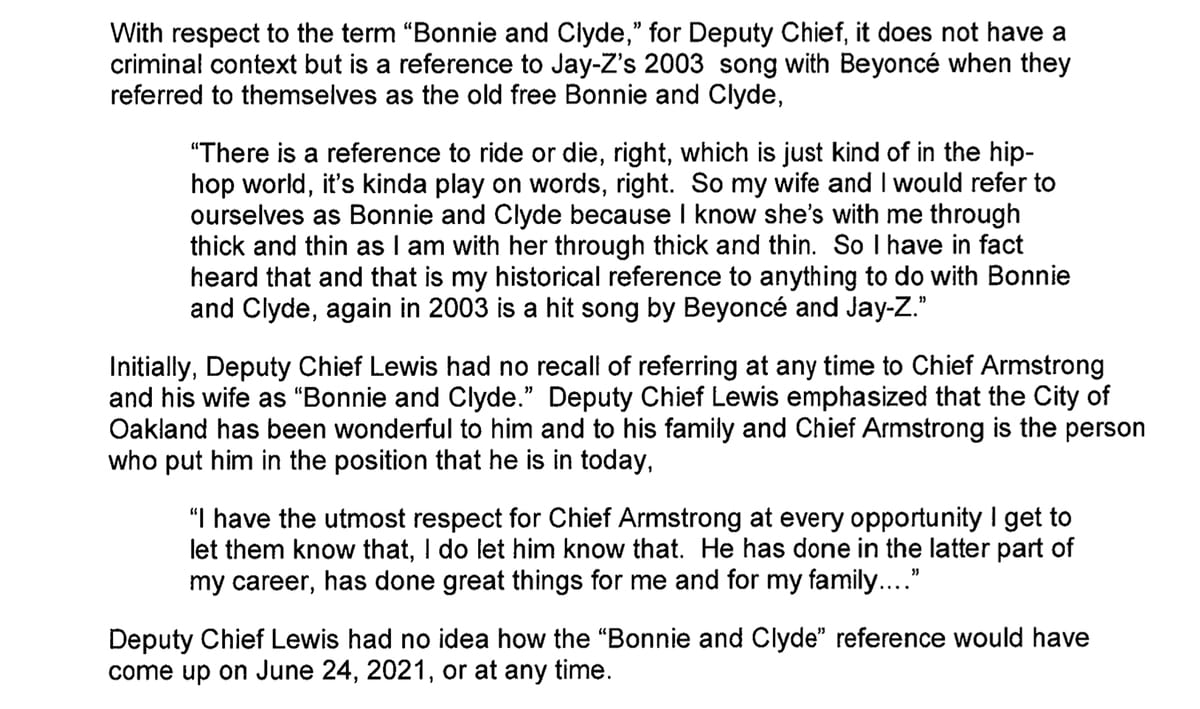
She noted that people had heard Lewis use the "Bonnie and Clyde" reference in the months prior to the Teams meeting as well as immediately before it. Some said it had seemed disrespectful.
She wrote that she had found the change in testimony between the first and second interviews "troubling and demonstrated a lack of credibility."
She continued: "I found it disrespectful to discuss Chief Armstrong's marital relationship in any context with OPD members. I also found his lack of consideration that others might associate a reference to 'Bonnie and Clyde' with criminal conduct as disingenuous."
Lewis did admit to speaking in general terms about drug addiction and said he may have referred negatively to having to attend so many OPD meetings, she noted.
Aside from that, he "denied each of the five allegations and the alleged facts underlying the allegations," she wrote.
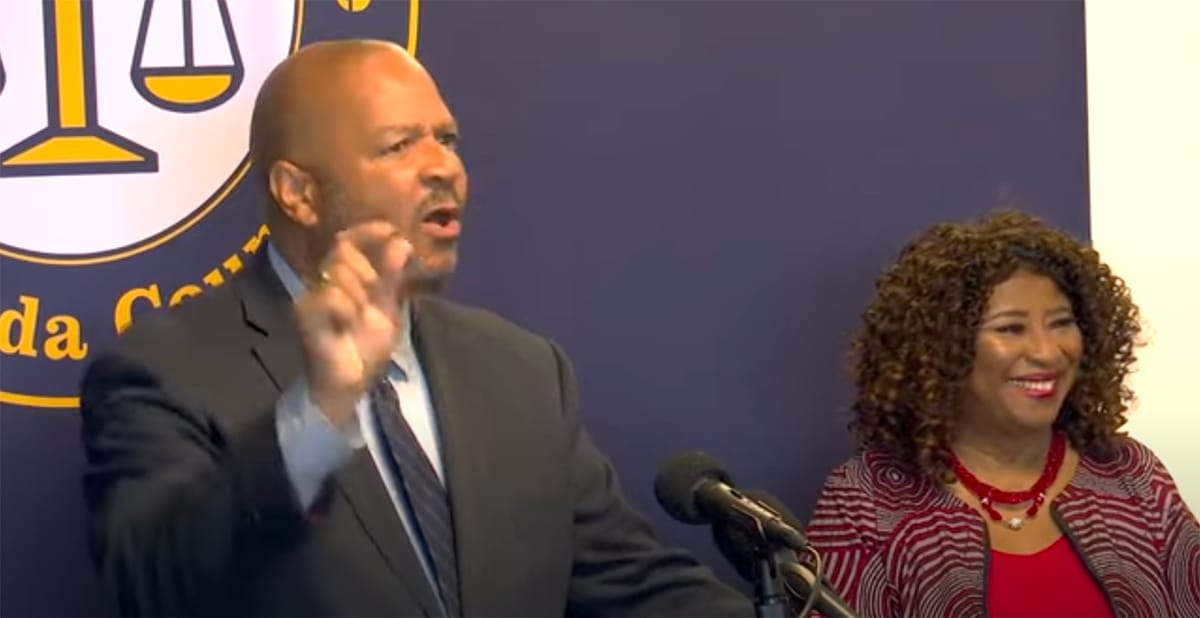
The investigator ultimately conducted nearly 30 interviews — speaking to most officers more than once — between July 22, 2021, and Oct. 14, 2021, according to public records.
She wrote that she found everyone she spoke with, aside from Lewis, "credible, meaning that there was no one I interviewed who I felt intentionally lied to me, or who was not forthcoming in providing information."
"I found compelling the consistency in and corroboration of the … witnesses who overheard what was said by Deputy Chief Lewis during the open microphone incident," she wrote.
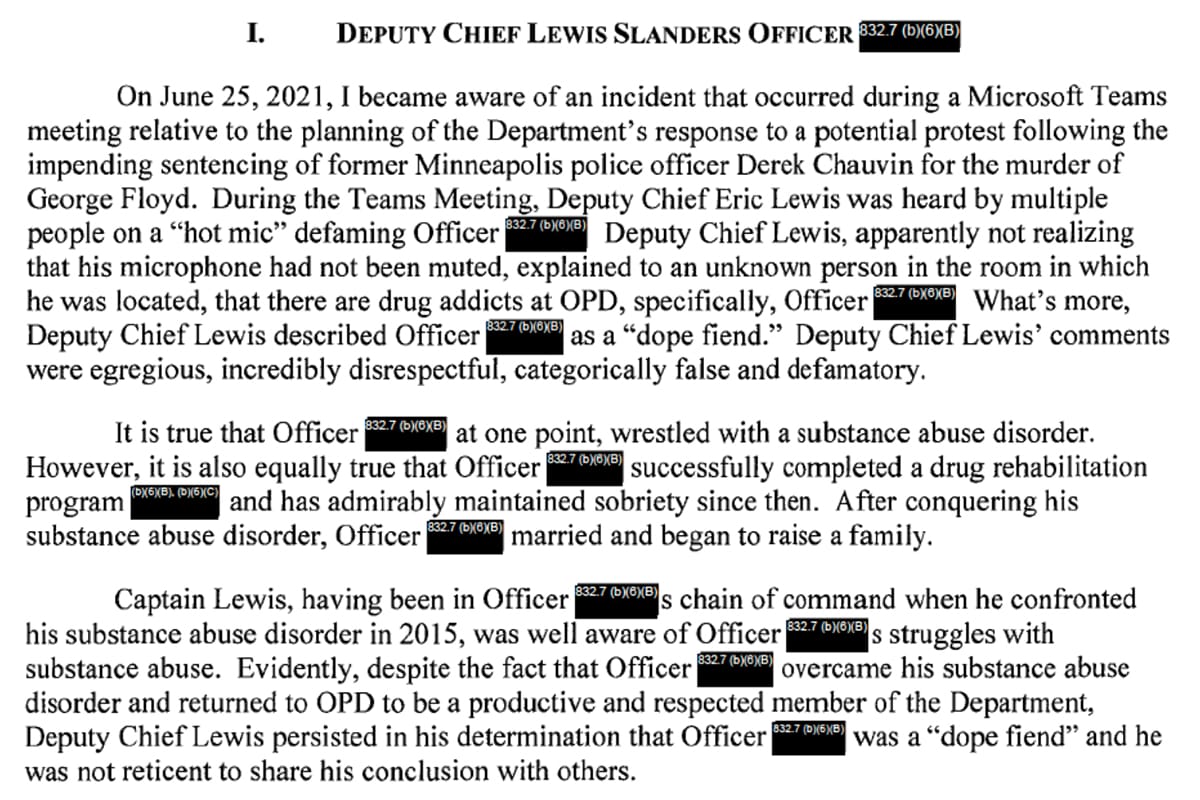
Officers told the investigator they had been shaken by what Lewis said on the open line.
One person said she "was in shock … and took off her earphones to see if she was on the correct call."
The meeting was not recorded, but she and others said Lewis had said something along the lines of "who let a meth head or crackhead barbecue" and made a reference to the officer living in "the ghetto of Oakland," the investigator wrote.
Lewis told the investigator he didn't know where the officer lived or anything about alleged drug use.
"I don't know if there's a representative from Internal Affairs here," he said during one of his misconduct interviews. "Perhaps I'll have to go file my own truthfulness [claim] in this case on whoever stated those things."
One person, who described the overheard comments as "almost like picking on a baby" or kicking someone when they were down, said they had seemed particularly egregious given Lewis' position in OPD's highest echelon: one of four deputy chiefs who had just one person, the assistant chief, between them and Chief Armstrong.
(Command staff and other supervisors are generally held to a higher standard than the rank-and-file.)
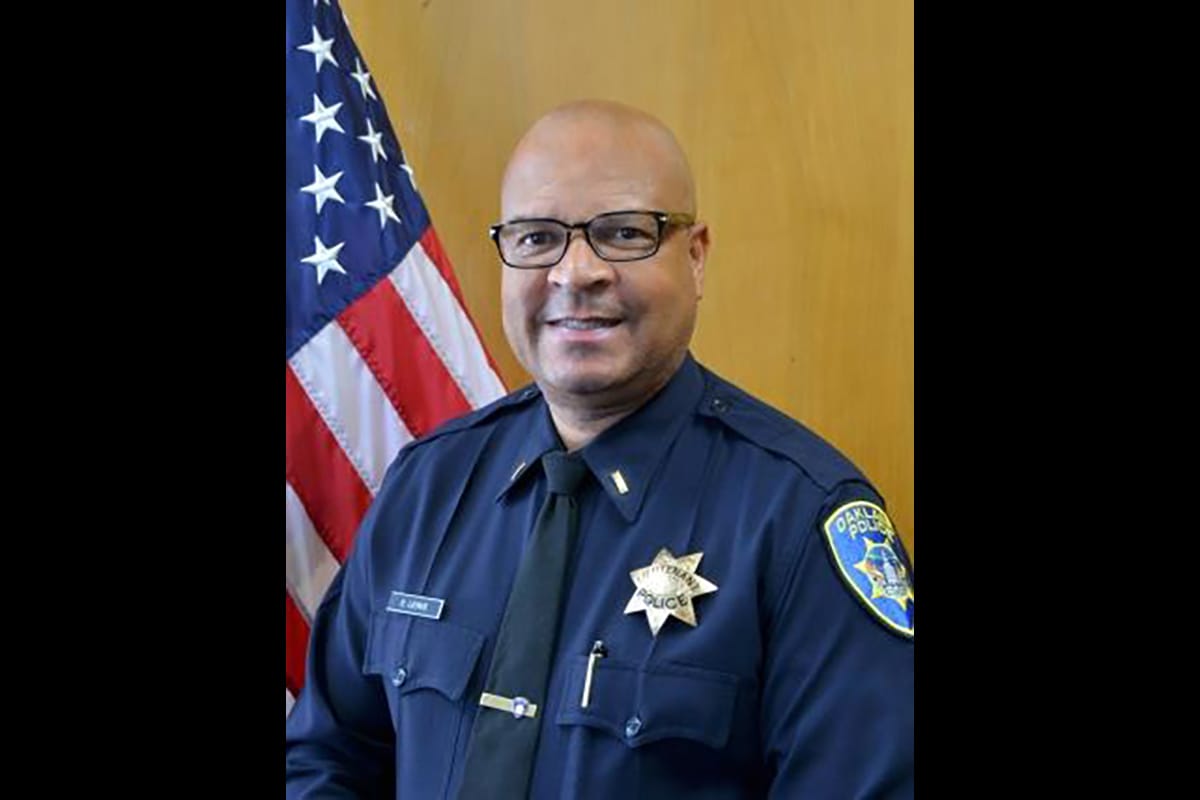
The investigator also asked witnesses about allegations from the anonymous note indicating that Lewis was a "known malcontent who contributes to the low morale of the department."
Most interviewees said they were unaware of anything like that.
But one said Lewis had been described as "disgruntled" and could be stressed, while another said the "general consensus," when Lewis had been a captain, "was that he was not around and people could not find him."
Ultimately, the outside investigator — Veronica Gray of Nossaman LLP — sustained misconduct findings for Lewis in relation to general conduct, insubordination — disrespect, criticism (of superiors and colleagues), revealing confidential information and truthfulness.
The two sergeants who were in the room with Lewis for all or part of the conversation also had sustained findings, both for unprofessional conduct.
(The Scanner is not publishing their names because that offense does not fall into the publicly releasable categories for police misconduct in California.)
One of the men received a written reprimand and the other had to attend a brief training session — but both kept their jobs, according to their settlement agreements, which were signed in August 2023.
What's next for DA Pamela Price?
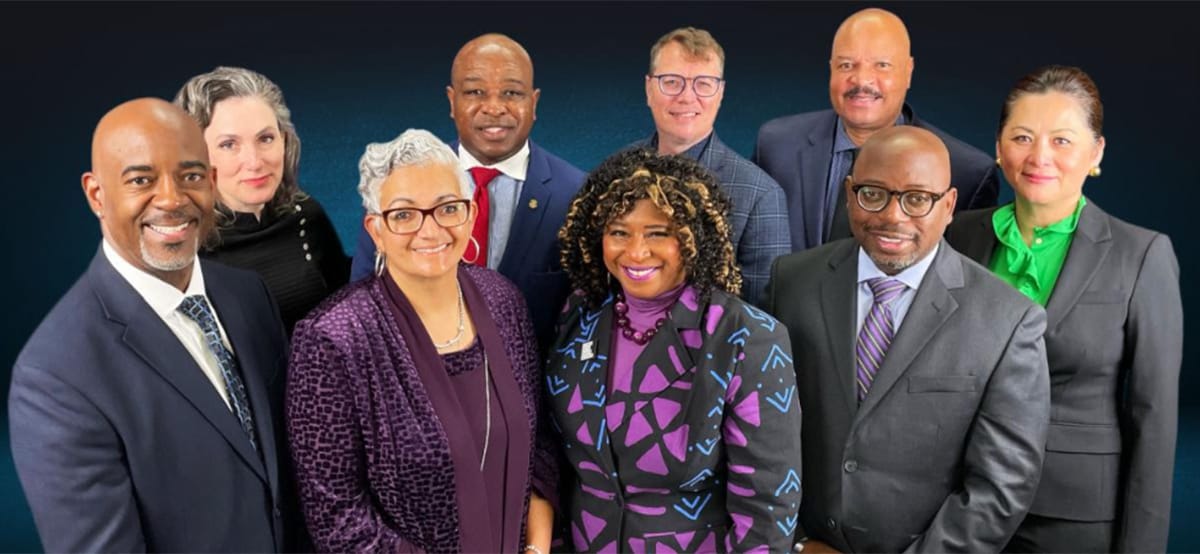
DA Pamela Price has faced a number of challenges as she heads toward a recall election in November.
At least three members of her original eight-person leadership team have left since she took office.
A fourth may also have left — but the DA's office has failed to respond to multiple inquiries from The Scanner about her possible departure.
Last week, a Bay Area criminal defense attorney said he was considering litigation against Price, alleging voter suppression and voter intimidation of her employees, among other claims.
Her office initially declined to comment but later denied the allegations.
That news came on the heels of a decision by the California attorney general's office to drop a misconduct case Price filed against one of her top critics.
The recall election takes place Nov. 5.
If Price weathers the storm, she will have four more years in office due to changes in state law that were approved in 2022.
Editor's note: The Scanner asked the city of Oakland last week to clarify when it posted the Eric Lewis investigative file online and why it closed The Scanner's California Public Records Act request without providing the relevant documents. There had been no response as of publication time.


